Nvidia is being forced to recalibrate its China strategy after the U.S. government imposed export restrictions on its H20 artificial intelligence chip, the company's most powerful processor cleared for Chinese sales.
Speaking on May 17 in Taiwan, Nvidia CEO Jensen Huang confirmed the company's next chip for China will not be based on the Hopper architecture that powers the H20. "It's not Hopper because it's not possible to modify Hopper anymore," Huang said during a livestream by Taiwan's Formosa TV News network.
The U.S. government informed Nvidia on April 9 that H20 exports to China would require a license, citing concerns that the chips could be "used in, or diverted to, a supercomputer in China." On April 14, officials confirmed these restrictions would remain in effect indefinitely. The company subsequently announced it would take a $5.5 billion charge in its first fiscal quarter related to H20 inventory and purchase commitments.
Despite these challenges, Nvidia isn't abandoning the Chinese market. Reuters reported earlier this month that the company plans to release a significantly downgraded version of the H20 chip for China by July. According to sources familiar with the matter, the modified chip will feature substantially reduced memory capacity and other performance limitations to comply with U.S. export controls.
China represents a crucial market for Nvidia, generating $17 billion in revenue in the fiscal year ending January 26, 2025—approximately 13% of the company's total sales. Huang visited Beijing in April shortly after the export restrictions were announced, emphasizing China's importance to Nvidia's growth during meetings with Chinese officials.
Huang also criticized previous AI export regulations, arguing they were misguided and should have focused on maximizing U.S. technology globally. The Trump administration has indicated it will cancel the AI diffusion rules introduced by the Biden administration, though specific chip export controls remain in place.

